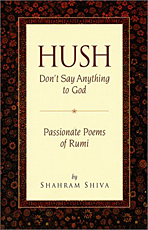Shahram Shiva was born in Iran and now lives in the United States. He is known for his inspired recitations of the poetry of the great Sufi poet Jelaluddin Rumi, which are often performed with musical accompaniment. Since Shiva speaks Rumi's language, Persian, he often gives audiences a sampling of the rhyme and meter of the original. Rumi did not sit down and write the poems; he recited them, often while walking or whirling, and his companions recorded them. "There is movement in every verse of Rumi," Shiva writes, "There is music, rhythm and breath in most of his poems in Persian.
This collection of new translations into English focuses on the theme of passion. Shiva explains: "They are about the joy of the lover and the beloved embracing, the pain of separation, the unnecessary childish games that make no sense at all but are part of the everyday fabric of being in love, the anguish, the invisible bloodshed, the escapes, the returns, the sacrifices, the humility, the acceptance, the teachings, the hypocrisy, the hide and seek, the secret meetings, the gut-wrenching pain and the willingness to die for one's loved one."
"To Love is to reach God" begins one poem. A lover acknowledges how different he is from his love and concludes that the only reason they are still together is that "God is the one running our messages." When we are in love, we can't behave modestly; we go out into the streets, our eyes glued to the window "waiting for a glimpse of your radiant face." But what friends see of each other is only a shell: "the rest belongs to the Beloved." One poem ends with a prayer:
Oh Beloved,
Take away what I want.
Take away what I do.
Take away what I need.
Take away everything
that takes me from you.
This is a wonderful addition to the many translations of Rumi now available. Read it with pleasure. And, if you get a chance to attend one of Shahram Shiva's performances — don't miss it! This poetry, like the original, is best heard with movement and music.
